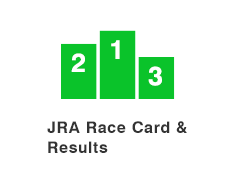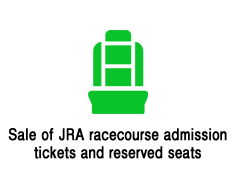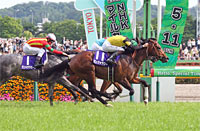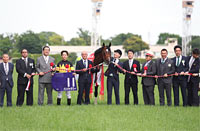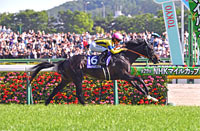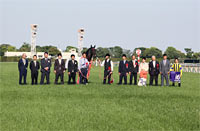Data Analysis for the NHK Mile Cup
3-year-old mile champion decider with every chance of an upset
The NHK Mile Cup in recent years has been a story of two extremes. Of the last 10 winners, five had been backed as the favorite to win the race. By contrast, Pink Cameo in 2007 (win odds 76.0), Jo Cappuccino in 2009 (39.8) and Meiner Ho O in 2013 (34.3) were all 10th favorite or lower, and in each of these years the trifecta pay-off was more than 1 million yen. So will the favored horses deliver on schedule this year, or will runners with lower favoritism produce a hefty pay-off? Let’s now analyze some points shared by strong performers in this race from results over the last 10 years.
Look for a graded race last time out
The last ten winners had all contested in “JRA graded races” in their most recent outing. Runners coming straight from other races have struggled, achieving Top 2 and Top 3 ratios of only 2.4% and 7.1%, respectively. We should not be overly confident of horses most recently seen in condition-class and non-Graded open class races. [Table 1]
[Table 1] Performance by condition of previous race (last 10 years)
| Condition of previous race |
Performance
[1st-2nd-3rd-4th or lower] |
Win ratio |
Top 2 ratio |
Top 3 ratio |
| JRA graded races |
10-9-8-111 |
7.2% |
13.8% |
19.6% |
| Other races |
0-1-2-39 |
0% |
2.4% |
7.1% |
If we then examine aggregate performances by runners previously contesting in “JRA graded races,” the races producing the most Top 3 finishers here are the “New Zealand Trophy” and the “Satsuki Sho (Japanese 2000 Guineas),” but the highest Top 3 ratio has been scored by the “Mainichi Hai” and the “Fuji TV Sho Spring Stakes” (excluding races producing fewer than three entrants in this race). This year, too, we might like to focus on runners coming straight from these races. [Table 2]
[Table 2] Performance by previous race (JRA graded race) (last 10 years)
| Previous race |
Performance
[1st-2nd-3rd-4th or lower] |
Win ratio |
Top 2 ratio |
Top 3 ratio |
| New Zealand Trophy |
5-2-3-58 |
7.4% |
10.3% |
14.7% |
| Mainichi Hai |
2-1-0-5 |
25.0% |
37.5% |
37.5% |
| Satsuki Sho |
1-2-2-19 |
4.2% |
12.5% |
20.8% |
| Oka Sho (Japanese 1000 Guineas) |
1-0-0-7 |
12.5% |
12.5% |
12.5% |
| Arlington Cup |
1-0-0-1 |
50.0% |
50.0% |
50.0% |
| Fuji TV Sho Spring Stakes |
0-2-1-4 |
0% |
28.6% |
42.9% |
| Chunichi Sports Sho Falcon Stakes |
0-1-0-6 |
0% |
14.3% |
14.3% |
| Flower Cup |
0-1-0-0 |
0% |
100% |
100% |
| Hochi Hai Yayoi Sho |
0-0-1-1 |
0% |
0% |
50.0% |
| Keisei Hai |
0-0-1-0 |
0% |
0% |
100% |
| Other races |
0-0-0-10 |
0% |
0% |
0% |
Position at 4th corner last time out is a key point
Of 30 Top 3 finishers over the last 10 years, 22 had passed the 4th corner in “7th position or higher” in their previous outing. By contrast, horses in “8th position or lower” have performed less impressively, with a Top 3 ratio of only 9.9%. When comparing the racing styles and other characteristics of each runner, we should place more weight on those passing the 4th corner in “7th position or higher” in their most recent outing. [Table 3]
[Table 3] Performance by position at 4th corner last time out (last 10 years)
| Position at 4th corner |
Performance
[1st-2nd-3rd-4th or lower] |
Win ratio |
Top 2 ratio |
Top 3 ratio |
| 7th or higher |
8-7-7-77 |
8.1% |
15.2% |
22.2% |
| 8th or lower |
2-3-3-73 |
2.5% |
6.2% |
9.9% |
In fact, of horses passing the 4th corner in “8th position or lower” last time out, those starting in bracket numbers “1-5” have fared even worse here, with a Top 3 ratio of only 4.9%. The only ones to finish in the Top 3 were the 2008 winner Deep Sky and that year’s runner-up Black Shell. We should perhaps have lower expectations of “stretch runners” and “trailers” if they draw an inside gate number. [Table 4]
[Table 4] Performance by bracket number in NHK Mile Cup of horses positioned “8th or lower” at the 4th corner last time out (last 10 years)
Bracket number in
NHK Mile Cup |
Performance
[1st-2nd-3rd-4th or lower] |
Win ratio |
Top 2 ratio |
Top 3 ratio |
| 1-5 |
1-1-0-39 |
2.4% |
4.9% |
4.9% |
| 6-8 |
1-2-3-34 |
2.5% |
7.5% |
15.0% |
Recent dominance of horses with good records in 1,600m+ turf races
Of the eighteen Top 3 finishers over the last six years, all except 2013 runner-up Impulse Hero and 2014 runner-up Tagano Burg had previous experience of a Top 2 finish in JRA open-class turf races over distances of 1,600 meters or more. Conversely, runners without this experience have only managed a Top 3 ratio of 4.2%. Although horses without Top 2 experience under these conditions performed strongly up to 2009, they have tended to struggle in recent years. [Table 5]
[Table 5] Performance by experience of Top 2 finish in JRA open-class turf races over 1,600m+ (last 6 years)
| Experience of Top 2 finish |
Performance
[1st-2nd-3rd-4th or lower] |
Win ratio |
Top 2 ratio |
Top 3 ratio |
| Yes |
6-4-6-44 |
10.0% |
16.7% |
26.7% |
| No |
0-2-0-46 |
0% |
4.2% |
4.2% |
Discount lightweights
Of the eighteen Top 3 finishers over the last six years, all except 2014 runner-up Tagano Burg weighed “460kg or more” in their previous outing. Horses weighing “Less than 460kg” have a Top 3 ratio of only 3.0%. So even if they come with a strong track record, lightweight horses should surely be considered out of the reckoning. [Table 6]
[Table 6] Performance by weight in previous race (last 6 years)
| Weight in previous race |
Performance
[1st-2nd-3rd-4th or lower] |
Win ratio |
Top 2 ratio |
Top 3 ratio |
| Less than 460kg |
0-1-0-32 |
0% |
3.0% |
3.0% |
| 460kg or more |
6-5-6-58 |
8.0% |
14.7% |
22.7% |
Strong favoritism last time out is a definite plus
Turning to the performance of runners most recently seen in anything other than “JRA G1” races in terms of their favoritism to win that race, horses backed as “4th favorite or higher” have been relatively strong performers over the last six years, amassing a Top 3 ratio of 26.0%. On the other hand, those backed as “5th favorite or lower” in that race have produced no Top 2 finishes here and have achieved a Top 3 ratio of only 5.1%. When checking the results of trial races, we should pay attention not only to the race content but also to the runners’ favoritism at the time. [Table 7]
[Table 7] Performance by favoritism in the previous race when it was not "JRA G1" (last 6 years)
| Favoritism in previous race |
Performance
[1st-2nd-3rd-4th or lower] |
Win ratio |
Top 2 ratio |
Top 3 ratio |
| 4th favorite or higher |
5-6-2-37 |
10.0% |
22.0% |
26.0% |
| 5th favorite or lower |
0-0-2-37 |
0% |
0% |
5.1% |
SEEK OUT THE WINNER!
Focus on runners with plenty of positive data
All of the last six winners had most recently contested a JRA turf graded race run over a distance of 1,600 meters or more. Other points shared by these six are that they had all passed the 4th corner in 5th position or higher last time out, had previous experience of wining JRA open-class turf races run over distances of 1,600m or more, and had weighed 460kg or more in their previous outing. Horses that meet all the conditions set in Table 1, Table 3, Table 5 and Table 6 could be regarded as strong candidates to win. [Table 8]
[Table 8] "Previous race (course)," "Position at 4th corner in previous race," "Highest finish in JRA open-class turf races run over 1,600m+" and "Weight in previous race" of winning horses (last 6 years)
| Year |
Winning horse |
Previous race (course) |
Position at 4th corner in previous race |
Highest finish in JRA open-class turf races run over 1,600m+ |
Weight in previous race |
| 2010 |
Danon Chantilly |
Mainichi Hai
(Hanshin / Turf 1,800m) |
5th |
1st
(2010 Mainichi Hai) |
466kg |
| 2011 |
Grand Prix Boss |
New Zealand Trophy
(Hanshin / Turf 1,600m) |
5th |
1st
(2010 Asahi Hai Futurity Stakes) |
506kg |
| 2012 |
Curren Black Hill |
New Zealand Trophy
(Nakayama / Turf 1,600m) |
3rd |
1st
(2012 New Zealand Trophy) |
466kg |
| 2013 |
Meiner Ho O |
New Zealand Trophy
(Nakayama / Turf 1,600m) |
4th |
1st
(2013 Junior Cup) |
482kg |
| 2014 |
Mikki Isle |
Arlington Cup
(Hanshin / Turf 1,600m) |
1st |
1st
(2014 Arlington Cup, etc.) |
470kg |
| 2015 |
Clarity Sky |
Satsuki Sho
(Nakayama / Turf 2,000m) |
1st |
1st
(2014 Icho Stakes) |
482kg |
(Masaya Ibuki)
|






